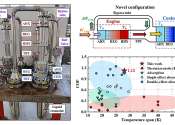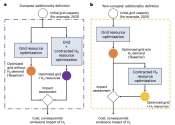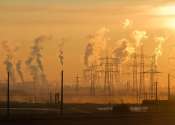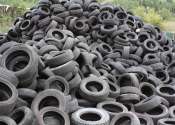Energy & Green Tech news
Energy & Green Tech
Coal generates less than 50% of Australian electricity for first time
Coal generated less than 50 percent of Australia's electricity in the last week of August, dropping to a record low as renewable production surged, data showed Wednesday.
1 hour ago
0
0
Energy & Green Tech
Catalyst design boosts performance of anion-exchange-membrane fuel cells
Fuel cells are energy-conversion solutions that generate electricity via electrochemical reactions without combustion, thus not contributing to the pollution of air on Earth. These cells could power various technologies, ...
23 hours ago
0
51

New alloy surpasses 2025 fuel cell performance targets
Scientists at the Daegu Gyeongbuk Institute of Science and Technology have created a fuel cell catalyst made from platinum and magnesium. The new catalyst, which uses the world's first platinum–magnesium alloy nanoparticles, ...
18 hours ago
0
20

Researchers overcome critical challenges in developing fire-risk-free aqueous zinc batteries
Researchers have developed a key electrode manufacturing technology that can control dendrite formation in aqueous zinc batteries. The team includes Dr. Jung-Je Woo from the Gwangju Clean Energy Research Center at the Korea ...
18 hours ago
0
42

Unraveling grid defection: The game theory behind our shifting energy landscape
Grid defection occurs when it's cheaper for consumers to produce their own power than to buy it from the grid. For example, if a consumer faces high monthly utility fees regardless of their actual usage and can generate power ...
17 hours ago
0
1
Energy & Green Tech
UK announces record green energy auction
The UK on Tuesday said it had awarded a record 131 new green infrastructure projects in a single auction, including plans for Europe's two biggest offshore windfarms.
17 hours ago
1
1
Energy & Green Tech
Seeing is believing: Your neighbor's choice to go solar might have influenced you more than you think
What made you decide to go solar? Was it a sober assessment of the return on investment? Did you want to cut your power bills? Did you want to do your bit on climate change?
20 hours ago
0
20
Energy & Green Tech

Q&A: Is air conditioning a threat to Switzerland's power grid?
The elevated temperatures this summer prompted many of us to crank up the air conditioning. In Switzerland, the energy used for cooling is approaching that for heating. What does that mean for power grids?
17 hours ago
0
1
Engineering

Engineering approach can improve stability of perovskite solar cells under reverse bias conditions
Solar cells based on perovskites, a versatile class of materials with promising optoelectronic properties, are gradually making their way toward commercialization. While these solar cells can have notable advantages over ...
Energy & Green Tech

Researchers create all-perovskite tandem solar cell with record efficiency
A team of engineers at Huazhong University of Science and Technology in China has designed, built and independently tested an all-perovskite tandem solar cell with record efficiency. Their paper is published in the journal ...
Energy & Green Tech

Norway's electric car sales set new world record
Electric car sales in Norway took a 94-percent share of the market in August—a new world record—statistics showed Monday, as sales in the rest of Europe stagnate.
Sep 2, 2024
0
65
Energy & Green Tech

Developing EV battery enclosures with lower carbon emissions
More charging power, higher range, lower environmental impact: In the COOLBat joint research project, researchers from the Fraunhofer Institute for Machine Tools and Forming Technology IWU have teamed up with partners to ...
Sep 2, 2024
0
19
Engineering

Researchers develop mobile test platform for offshore wind turbines
Public power grids are highly complex systems. Wind turbine manufacturers have to comply with technical guidelines when connecting new turbines to avoid putting grid stability at risk. In the Mobil-Grid-CoP project, researchers ...
Sep 2, 2024
0
1
Engineering

Aluminum foil that can clean water—researchers develop coating that attracts and traps dangerous microbes
More than 2 billion people around the world do not have access to safe, uncontaminated drinking water. Around 418 million of them live in African countries.
Sep 2, 2024
0
1
Business

Q&A: China's interests in Africa are being shaped by the race for renewable energy
China-Africa relations have deepened over the past two decades, characterized by increased economic cooperation, investment and infrastructure development. China is now Africa's largest trading partner, with partnerships ...
Sep 2, 2024
0
21
Energy & Green Tech

Sports boats set out on a voyage to electrify the waters in the same way Tesla electrified the roads
Grant Jeide looked like another dude riding the rollicking waves left in the wake of a 23-foot (7-meter) boat ripping through the water at speeds of up to 40 miles per hour on a river in Northern California's Delta earlier ...
Sep 2, 2024
0
22
Energy & Green Tech

Pilot plant demonstrates iron-based hydrogen storage feasibility
Photovoltaics are set to meet over 40% of Switzerland's electricity needs by 2050. But solar power isn't always available when it's needed: there's too much of it in summer and too little in winter, when the sun shines less ...
Aug 31, 2024
0
30
Engineering

Researchers develop ultra-high efficiency perovskite LEDs by strengthening lattice
A research team has developed ultra-high efficiency perovskite nanocrystal light-emitting diodes (LEDs) by strengthening the perovskite lattice and suppressing the material's inherent low-frequency dynamics.
Aug 30, 2024
0
47
Business

What if Big Oil championed—and profited from—the green transition? Here's how it could work
Like the petroleum industry itself, households are heavily invested in existing transport technologies. Getting oil and gas companies—and consumers—to switch to zero-emissions transport is a huge challenge.
Aug 30, 2024
0
23
Energy & Green Tech

Making homes ready for net zero depends heavily on people's understanding and habits, says UK researcher
Forty percent of UK greenhouse gas emissions come from households, so the sustainable construction and everyday running of our homes could play a major role in achieving a low-carbon society.
Aug 30, 2024
0
2
Engineering

Scientists develop eco-friendly microfabrication method using water and paper
Imagine being able to create incredibly tiny structures with the same ease and sustainability as printing on paper. This is the frontier of microfabrication—the process of making microscopic structures that are crucial ...
Aug 29, 2024
0
84
Energy & Green Tech

Researchers discover a surprising way to jump-start battery performance
A lithium-ion battery's very first charge is more momentous than it sounds. It determines how well and how long the battery will work from then on—in particular, how many cycles of charging and discharging it can handle ...
Aug 29, 2024
0
24
Energy & Green Tech

Scalable graphene technology could significantly enhance battery safety and performance
Researchers at Swansea University, in collaboration with Wuhan University of Technology, Shenzhen University, have developed a pioneering technique for producing large-scale graphene current collectors.
Aug 29, 2024
0
64
Energy & Green Tech

Quarter of China's energy now comes from non-carbon sources: white paper
A quarter of all the energy China consumes now comes from non-carbon sources, according to research published Thursday, as Beijing rapidly pivots its huge economy to a greener footing.
Aug 29, 2024
0
1
Engineering

How low can we go? Radical change is needed to cut the carbon that goes into buildings to net zero, say researchers
Buildings are one of our biggest contributors to global heating. They produce 37% of all greenhouse gas emissions from energy use and production processes. Building emissions are made up of two parts: operational carbon (from ...
Aug 29, 2024
0
7







































